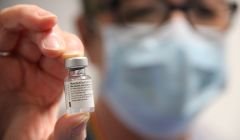Coronavirus / Health board not overly concerned by Covid infection figures
COVID figures suggesting that Shetland currently has the highest infection rate anywhere the UK is not necessarily an accurate reflection of the true numbers and should be treated with a pinch of salt, according to the local health board.
With the recent changes to the testing and mask wearing policies any statistics produced can only give an indication that Covid is still around and may well show a steeper decline in infection rates than is the case.
According to data.gov.uk Shetland had 606 cases per 100,000 population in the week to 1 May, while Public Health Scotland has published a figure of 393.5 cases per 100,000 population in the seven days to 3 May.
According to these latest figures the infection rate in Shetland is double that of the Scottish average of 204.9.
On 5 May, the most up to date data available, there were 1,226 new confirmed cases in Scotland, eleven of which were recorded by NHS Shetland.
Meanwhile Public Health Scotland is moving to weekly case number updates instead of daily due to the general population no longer needing to test.
“We always knew that Covid would continue to circulate in the community, along with many other respiratory infections, as restrictions have lifted,” said Dr Susan Laidlaw, the interim director of public health at NHS Shetland.
“And in the island boards where communities had been relatively well-protected for most of the pandemic, it was inevitable that rates would increase as more people became exposed to the virus.
“Although the rate in Shetland is relatively high compared to other boards at present, if you consider the total number of cases and the rates overall for the whole pandemic, we are still amongst the lowest in Scotland along with the other islands boards and rural areas.”
Become a member of Shetland News
Dr Laidlaw added: “Although people will of course still get infected with Covid, the risk of serious illness, and people needing intensive care and people dying has decreased considerably.
“This is primarily due to high vaccination coverage in the community. We have some of the highest Covid vaccination rates in Scotland, which were achieved before the more recent surges in infection and have been successful in minimising serious illness despite more people being infected.
“We also now have effective treatments which help to prevent serious illness in the most vulnerable people if they catch Covid.”
The deaths of 18 people across Scotland who had died within 28 days of their first positive coronavirus test were included in the figures released on 5 May. The UK wide figure for daily deaths was 228, as released on 6 May.
Dr Laidlaw pointed out that there were still measures in place to protect vulnerable groups in the community, especially those in care homes and people in hospital and health care settings.
“Although the rest of the community no longer needs to wear face coverings or do any testing, or isolation; health and social care staff still have to test regularly and adhere to rigorous infection prevention and control procedures; visitors to health and care settings still have to wear masks and test; patients and residents still have to isolate if they test positive for Covid,” she said.
“And it is likely that these measures will continue to some extent probably for a while. Of course the advantage of these measures being in place, is that they also help to protect vulnerable people from other infections such as flu, which can also cause serious illness and death in these groups.”
She advised that people should continue to take “very sensible, proportionate precautions” to help reduce the spread of whilst “recognising that they will not completely stop Covid”.
These include:
- Get vaccinated – if you have not already had the full course recommended for your age /health conditions;
- Good hand hygiene and respiratory hygiene;
- Keep indoor premises well-ventilated, be outside if you can (also good for mental wellbeing);
- Wear a mask and test if required to do so to help protect vulnerable groups;
- Stay at home if you have symptoms of respiratory infection and feel unwell, or have a fever – avoid spreading it to other people;
- Follow the relevant stay at home guidance if you do test positive which can be found here.
Become a member of Shetland News
Shetland News is asking its many readers to consider paying for membership to get additional features and services: -
- Remove non-local ads;
- Bookmark posts to read later;
- Exclusive curated weekly newsletter;
- Hide membership messages;
- Comments open for discussion.
If you appreciate what we do and feel strongly about impartial local journalism, then please become a member of Shetland News by either making a single payment, or setting up a monthly, quarterly or yearly subscription.

















































































